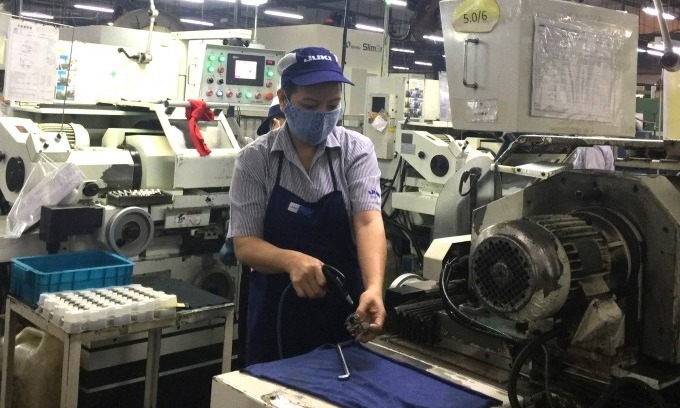Factories reduce work hours with eye to employees’ well-being
When the end-of-shift bell rings at 4 p.m. at a factory belonging to industrial sewing machine producer Juki Vietnam in District 7’s Tan Thuan Export Processing Zone workers have five minutes to clean and organize their work area before leaving.
Nguyen Thi My Linh, who has worked at Juki for 28 years, said until a few years ago her shift used to be the standard 7:30 a.m. to 4:30 p.m. every day except Sunday with 70 minutes for lunch and two other breaks.
But after workers expressed difficulty in picking up their children, the management agreed to shorten their shift by 25 minutes.
“Getting off early helps me avoid traffic and gives me enough time to pick up my child in Nha Be District, take them home and then to District 5 for tutoring,” Linh says.
A Juki employee during work hours. Photo by VnExpress/Le Tuyet |
Nguyen Phuoc Dai, chairman of the company’s labor union, says employees also get two Saturdays off per month after they said they did not have enough weekend time with their families, which has reduced their week to less than 44 hours.
The maximum allowed by law is 48 hours, not including overtime.
Dai noted that the company did not reduce wages or income when it cut the work hours, and instead invested in technology and optimized production processes to ensure productivity.
An Thien Pharmaceutical Corporation in Nha Be’s Hiep Phuoc Industrial Park similarly used to have a 48-hour week before switching to 44 hours in the past decade.
Its director of human resources, Le Dinh Chi, says the change came after the labor union forwarded workers’ wishes for shorter hours.
“Reducing working hours is a way for management to show concern for the well-being and families of employees.”
The company’s 450 workers earn an average of VND13 million (US$530) per month.
 |
An An Thien employee during work hours. Photo by An Phuong |
According to the city Trade Union of Industrial and Export Processing Zones, Juki and An Thien are among more than 20 manufacturing businesses in the city’s industrial parks and EPZs that have moved away from 48-hour weeks.
Some have even reduced it to 40 or give employees three Saturdays off every month, it says.
Vu The Van, its president, says these firms’ decision to shorten the work week is commendable since it is recommended but not mandated by current regulations.
Reducing work hours is also a strategy for businesses to retain employees amid a growing labor shortage in the manufacturing sector, as workers with more time for themselves and their families tend to feel happier and more motivated to remain loyal to the company, she says.
Concurring, Thanh Nguyen, CEO of human resources consulting firm Anphabe, says a survey by her company found that time-related benefits and work arrangements are the biggest concern for 63% of workers while only 24% of them reported being satisfied with their working hours.
The 2020 Labor Force Survey by the General Statistics Office found that nearly 41% of workers nationwide clock in 40-48 hours per week, 30.9% log 49-59 hours and 7.5% work 60 hours or more.


Comments are closed.